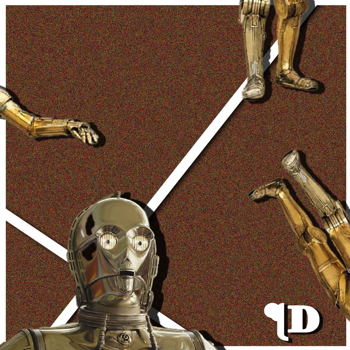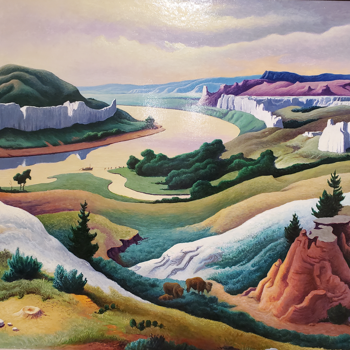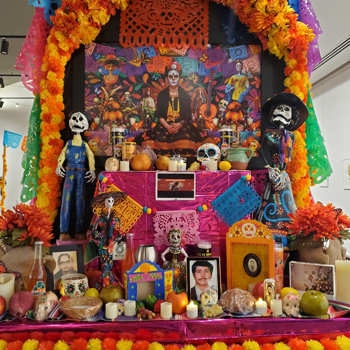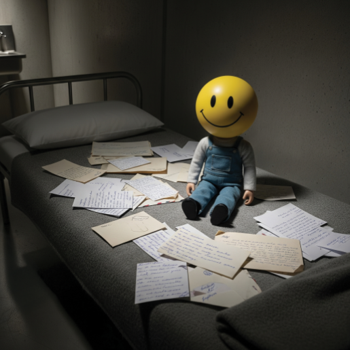Belgium Fog
 Artwork by Wassily Kandinsky, "The Night"
Artwork by Wassily Kandinsky, "The Night"
I didn’t realize I had been lonely for so long until I stepped out of the Brussels Airport and into the Belgian world of overcast and rain. Not until the second month of school was done at KU Leuven, in October, was my enthusiasm for the new school year weighed down, causing me to list like a ship and drift to a tavern called Ixelles, where I became a regular. It had low vaulted ceilings of white brick and was 600 years’ old, much like the “Katholieke Universiteit” of Leuven, where I was pursuing my doctorate as a refugee from the States, an escapee from my parents. This is where I met the woman Anneke, who became like a fellow sister and mentor to me, setting to aright my ship, as well as providing me with more bewildering services, such as a toad she produced from her sweater pocket there beside me at the bar. “I know it’s strange,” she said, “but please accept it.”Wordlessly, I took the toad.
“You were saying?” She lifted a wide-bowled glass of red wine to her lips.
“Yeah, I was saying. Right. The Leuven psychiatrist was no help. And thank you. By the way.”
“For what, dear?”
“I just—can't believe I’m confiding in you so much. I guess I really needed somebody to talk to. To tell you the truth, I don’t quite know what’s wrong with me.” I caressed my stomach and chest. ”There’s a sudden… emptiness here. And I don’t know what to do about it. I don’t know why it’s here, where it came from—and you, you’ve been very helpful tonight. Maybe it’s just being alone and in a foreign country, you know? And also thank you. Thank you for the—the toad.”
The toad, gray and large as an apple, was tranquil and limp in my hands. I placed it on my thigh.
Anneke set down her glass, very earnestly put her hand to my knee. “Sometimes,” she looked at me, “having an animal to take care of is so important. It just connects us to the ground.”
“Wow. Yea. Thank you.”
“How is your school?—your work, rather,” she said.
“Thankfully, still good. The days are a slog. All the days are a slog—and I had no idea it could be so foggy here!” I paused. “That is such a ridiculous thing to say from a woman completing her electroengineering PhD at Leuven.”
“Mhmmm,” Anneke nodded her head, her tones hushed. Suddenly, she poked my shoulder hard. “Mon ami, you should journal.”
Anneke was an older woman, properly comfortable in her body, which I presumed was that of someone in her 50s, though it was hard to tell. She had broad hips and thick, curly brown hair parted down the middle. In a certain light, the peach fuzz on her upper lip and the grays in her head would go invisible, and she looked young and in possession of radiant charm.
I put my hand to where she poked me.
“You know, you’re right. Studies say that journaling is a great way to self-reflect, an aid in problem-solving—.”
“Studies?” Anneke said. “Mon ami, journaling enhances the clarification of the self.”
#
So I journalled.
I wrote about my time back in my home of Annapolis, Maryland where, certainly, the skies were a whole lot more blue. I jotted down the expectations behind my parents’ smiles. How their façade was a front for some unstoppable, deeply impersonal force that willed me on despite myself. It displeased me that all their resources were spent on maintaining their health and beauty and not, say, giving it to others. I thought also of how my home state, among those sunny skies and neighborhood roads, somehow suppressed my emptiness with its pedestrian bonhomie. It moved my loneliness beyond my awareness—while Belgium had at once liberated and enchained me to my situation.
I put my pen down at my desk, dropped another cricket in the toad’s terrarium—now stuffed with branches from the nearby Dijle Park—and walked off to central Leuven before suddenly stopping outside my flat.
So, then today was the day it was going to be, I thought. I sighed.
It had been so long since I thought of it, my pen hand resistant, my mind rolling its eyes. I went back inside, ran up the stairs, grabbed my pen and notebook—and the toad—and went back outside for the walk.
Dabs of baby blue appeared through the cloud-blanket overhead, bearing down the sun’s yellow light. It ignited Leuven from its overcast pallor to the fire-engine red of its brick homes, the golden leaves of the poplars that lined its avenues—before finally refracting its heavenly shine in the otherwise black, impassive windows of the city’s historic buildings.
When I arrived to the Old Market—a town square of smooth stones—the space became expansive and conspicuous. The stately facades of the gothic buildings, uniform in their solemnity, were flush—as well as visually fused together—by the horizontal banisters of their windows, like sentinels born of another age.
Why had I come here—all the way from Maryland—to undertake a PhD in electroengineering?
I pursued doctoral research on the architecture and workings of the battery—particularly for the perfect, one-to-one ratio of energy available to energy transferred—to combat the smokestack economy with the optimization of EVs and more. But it doesn’t feel like it’s me who’s pursuing it—and I’m just in too deep to turn back.
I’ve had no boyfriend, nor any constant friend, the few girlfriends I have had coupled up. Indeed, I only ever fucked strangers I met in bars when, agitated and itchy, I handed over my reins to the succubus that haunted my personnage feminine.
In that mental mess, fumbling through the city streets, I took out my pen and notebook while walking and groped for the memory that it resisted: the big red semi-truck careening through the state road between our rural neighborhoods, the tribal wails of my mother and my father—my little sister’s dirty blonde hair waving left and right as she walked away from the front porch for the last time.
I sat now in the pew of Sint-Pieterskirk Church, the toad beside me, and tilted my chin back to the white-vaulted arches above, my notebook turned to a fresh page and bearing only a single written word.
Allison.
#
My tilt always brought me to the pub and, more often than not, Anneke was there and alone. She was more relaxed than last time, no latent energy behind her, and was instead sedated as she nodded indulgently to my self-discoveries—that “clarification of the self,” as she had called it.
“All I can say is that this is good—this is good, Allison,” she said.
“Yeah.” I turned my glass of pilsner on the stone top bar, nodding.
We both gazed at the liquor shelf behind the bar top. A slight pause.
“Did you notice anything,” Anneke went on, “about having written your own name, rather than your little sister’s?”
Re-gripping my beer, I opened my mouth—then closed it. “I have no idea why it was my name on there, and not hers. In fact, for a long time after in that church I kept saying my name out loud quietly to myself. You know, I even picked up the toad and chanted it. ‘Allison. Allison. Allison!’
“Have you been feeling better?
“Not better, but not worse. More confused.”
She nodded, shrugged. “I wonder. Have you ever heard of Eugenius Philalethes?”
“No. I don’t think so.”
“We Europeans have many silly writers.” She brushed away nothing with her hand. “They’re delightful! Furiously writing away, by candlelight. And how wonderfully self-involved they were! Well, Eugenius was claimed to have written a book, only recently now found, where he wrote about a new, unspoken invention in mankind. This was the invention of the private person. Look. See?” She showed me an old book titled, The Invention of the Private Person. “I think you should read it, it can help!”
I turned to her. “Do you always help people like this?”
“It probably has something to do with being from Naours, in France.”
Being an American, I made an effort to not be star struck by such basic European credentials.
“It is very small,” Anneke went on. “About a thousand people. But for centuries it was bigger, by several thousand. And underground. We hid there to take refuge from the Thirty Years’ War. It had even an underground tunnel system, with hidden ducts for hearths and chapels—even town squares down there!” She took a long draught of her wine, then winked. “I liked to think that some of the best communities are cultivated in concealment.”
“I think I like those communities best,” I said. “And so what do you do now? How come you’re here, in Belgium?”
She waved her arm, and I was shocked by the sudden, nearly imperceptible violence with which she blocked the question. She took another drag from her wine glass.
Was she uncomfortable about it?
“Allison, mon ami, continue your journaling, take the book. And don’t forget about the toad.”
#
In my flat, there was the olive-green wine bottle on my desk I had bought on my way from the bar, the old, tattered book, my notebook and pen—as well as the glum stoicism of Anneke’s toad—all of which did not feel absurd, but a tableau tailored to my condition. With night fallen and all but a reading light switched off, I willed into existence a hidden place. Like an interstellar lifeboat, I ejected myself from the mother ship that is earth into a private outer space.
The toad’s transparent membrane rose and closed over slit-shaped eyes designed for the twilight. I took Anneke’s book, flipped it to a random page and placed it on its spine on the table, smelling its sweet decay, its mustiness and aged vanilla.
Then I wrote—or, at least, I tried to.
Instead, I only looked up to see my transparent, ghost-like reflection on the window, my interior possessing the constellations of window-lit Leuven beyond it. I did this for about twenty minutes before getting up, putting on a hoodie and covering my head with it for warmth, then sitting back down.
Idealism launches like a rocket that soon runs out of fuel, because years now into my doctorate I have no money. Friends, or the few I know, they have staggering materialistic wealth—and connections, too. Like normal people. Barely two-thousand dollars comes to me a month through student stipends and bank loans, though PhD students are masters at delaying self-gratification. If I ever achieve and patent a breakthrough on battery design I’ll have struck oil, but…
It’s not just that either.
I peered over to look at a passage from the book, and found a single block of text, labeled “CXIII.”
I skimmed past some strange sentences about hermeticism.
… For whiles I sought the world I went beyond it, and I was now in quest of a substance which without art I could not see, for I had arrived at a type of statement, “Everything changes. Why cannot everything stay the same?” For Man had at the first, and so have all souls before entrance into the body, an explicit, methodical knowledge; but no sooner are they vested than is that liberty lost, and nothing remains but a vast, confused notion…
I looked at the publication date—1637—and slumped back in my chair.
Indeed, why can’t everything stay the same? I could have been anything—I could have been a beekeeper, even.
Feng Da, a doctoral researcher at the Carnegie Institute, in Washington D.C., was hired and made by a single paper outlining the key parameters that influenced cell fabrication and testing. Picked up by a global automaker, he went from pauper to prince overnight, and nothing changed about him but that his presence held an entitled glee during experiments and whenever in conference with other scientists—(I would know, I had worked with him)—until one day he absent-mindedly walked over the warning line at the assembly plant and the hydraulic press ripped his right arm from his shoulder, leaving him reeling—his liquids squirting on the epoxy floor in a spiral.
His research is still used to fuel bottom lines.
So, why not be a beekeeper or a barista, until the end of my days?
I shuddered. The long-cooked meat falls off the bone without effort, I thought to myself, in a deep and clambering alarm. I felt like Feng then, too, watching my academic passion leave me like the blood squirting from his ripped-off arm, the stream of his lifeblood slowing to the beat of his dying heart.
#
I was glum at the tavern, picking up and putting down the house abbey beer, drink after drink, when I had noticed Anneke, like a shadow, suddenly there beside me.
“My God,” I said. “You look like how I feel.”
She nodded to the apse where a cocktail table was, in the corner and under the vaulted arches. “I had been there.” She paused, to either burp or hiccup, then didn’t. “I didn’t notice you either.”
“And what do you drink to?” I said.
“I am asking you the same thing, ma cocette.”
“What have you given to me? Something’s unraveling in myself. Something snapped, Anneke. I don’t give a flying fuck about this PhD anymore. I don’t care—I don’t know what I’m doing, where I’m going.” I hiccupped, patted the seat next to me. “Come join me on the journey of the aimless, why don’t you?”
She sidled onto the bar stool like she was saddling a horse. We snickered.
“I can’t tell if you’re showing up at the best of times. Or at the worst of times,” I said.
“Both, it would appear.” She eased into herself when she sat, both elbows now on the bar top—she was stable then, and lifted two finger to the bartender for another round for both of us.
“I am doing this um, well, what my generation calls, ‘inner work,’ Anneke—you know. What you say. Journaling. The Toad. This—this book you gave me. But it’s not my sister. And now I don’t have a purpose any longer. So I don’t get closer. I get farther away.”
I saw her teeth flash —a type of smile I had never seen on anybody—and when I blinked it was gone.
“Ach! Mon ami.” She swayed on the bench and with her sleeve wiped her face. “What if farther away is closer, no?”
“Then what—,” I hiccuped, “—what’s my next step?”
She shook her head. “Ah. Well. There is… No, mon ami. You wouldn’t like it.”
“What?”
She shook her head again. A large, noisy group came in. We sat and quietly drank at our seats for several rounds, us being too inebriated and the crowd too loud for any real conversation, talking about the foggy weather, the storied city, the Belgian countryside.
I saw that young, glamorous beauty in her. But when she turned, her face moved out of the light, and I saw every iota of her age—of a face that could have haunted those tunnels in Naours.
She was so stable, and I was so thankful to have her. When the bar became quiet again, she said, “Come with me,” and we left through the Leuven-city streets, stumbling together in silence through the alleyways; me, following her blurry figure.
She unlocked the key to her basement apartment. Once inside, a black cat bolted out of sight and into a doorway, which Anneke then softly closed. Anneke pushed away several paper bags filled with empty wine bottles and rotted vegetables with her foot. The place stunk, and it was dark but for a terrarium’s red glow filled with trilling toads and chirping crickets. She approached a kitchen table and, with one long sweep of her arm, pushed the beer cans and ash trays off it into a trash bin.
She whispered, “Please, sit down,” motioning to the table.
“What are we—what are we doing?”
She lit a few candles and incense, placed them in a particular position on the table, then turned off the terrarium light. I saw her disembodied face—seemingly larger than before—hover in the darkness just over the candlelight. Her hands came into view. “Give me your hands.” We held hands above the table, and she muttered in a language without consonants.
“Anneke—.” I whispered.
Her head nodded, and I thought it was going to drop on the table, when her eyes rolled back into her head.
“Anneke!”
She was slumped over now, a pool of drool filling her mouth, a slight tremor shaking her shoulders.
The door the cat ran into creaked open. The candle’s flame leaned from a draft of cool air. Inside, I could hear something, like the rustling of the long robes of the whirling dervishes.
Something was calling me. I took my hands from hers, stood slowly, and walked in. The interior was pitch black. Inside, the shadow of the black cat pattered to a distant light of midnight blue. I walked to it, but it became windy. A roaring current blew about me, deafening me.
Then it was gone.
Beside a cocktail table draped in cobalt-colored cloth was a serious, old man in a black turtleneck. Around us was that invisible whirling sound again. He was saying something under his breath, a voice that echoed both far away and near.
#
“Every human being is empty at their core. But nothing is making them empty.”
He spoke with a flinty growl, a hard chin.
“The problem is not that happiness is inaccessible, but that they love unhappiness so much more. This is the world’s burden. A creature with no imagination for a terrible beauty.
“The inner void, the loneliness. Investigators of that emptiness will find its hollow shell. They will engage with its terror, but only because they want the higher order—yet still, they will join the legions that have died in those trenches of the Self.
“—It’s because they cannot picture locking their arms with all their brothers and sisters, and running across the sniper’s pass. They cannot imagine the full mystery behind the happy suicide.
“No, they must experience it, Allison.”
Inside and out, I was paralyzed. My body and mind were frozen.
Then he turned to me with glacier-colored eyes and took my hand.
It was warm.
“It comes from the outside, Allison. It comes from the outside—for many have read Aquinas’s five proofs of God, but it wasn’t until the sun itself was outside their door that they finally saw the truth.”
#
Somehow, the next day, I woke up in my apartment. The toad was croaking.
Hungover, I fixed a cup of coffee.
I was vaguely aware that I had much to think about. Because I was unsure of where to start, I kept circling the subject in a mental toggle, utterly silent on the inside. An alien feeling of numinous calm pervaded as I swirled the milk into my coffee with a spoon, tore open the Splenda packets, and took a long sip, my nose filling with its steam, its aroma.
I grabbed my jacket and went to find Anneke’s apartment, but couldn’t remember where it was through my memory’s alcoholic haze. Return journeys availed me nothing, too. And so, night after night, I went to the tavern to await her.
But she never came.
At the end of the semester, my parents, who could be old fashioned on semi-formal occasions, sent me a letter through the post.
They wished me well for Christmas. They allowed themselves the indulgence of politely asking me to come home, though they admitted I would never go.
Then they wrote this:
…also, Dad and I found this poem below and it struck us as peculiar. We don’t know what to think of it. We don’t know who it’s by either. Kisses and hugs. The Call of the Great
Smile. The Orange and Red Feathers
Flash off Autumn’s Oak Trees.
Wisdom Wins, Sends the Sparkles
—You Were An Empty Vessel.
—With love, mother and father.After all that, I was quiet on the inside for a long time before I finally allowed myself to speak.





